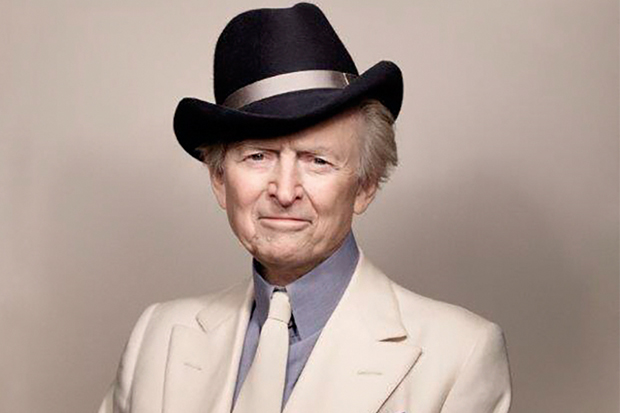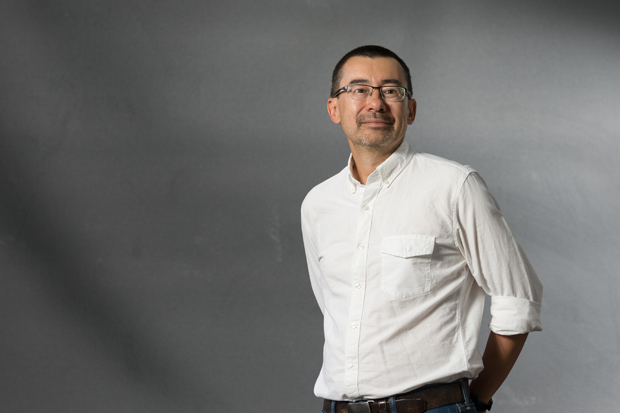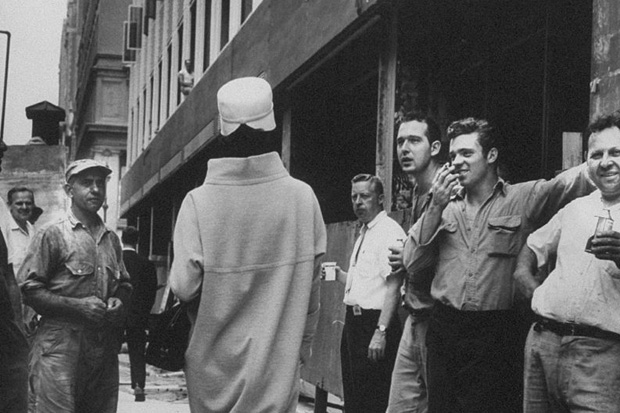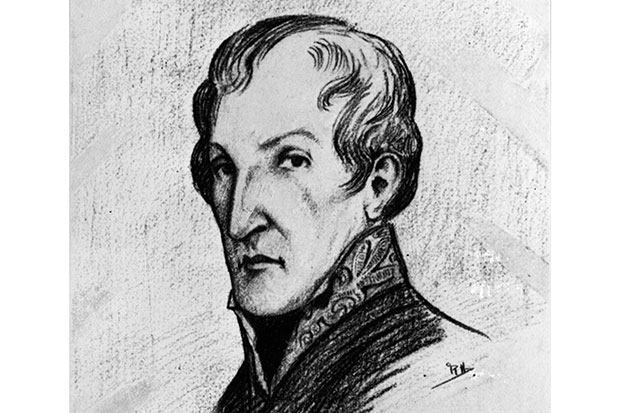He might be 85 but Tom Wolfe is going strong with a new book and a dustjacket photo that still sees him working the suit and hat look. And although the new book may be small, it’s got big ambitions: first, to take down an establishment icon, and, second, to reveal the secret behind humanity’s progress.
The establishment icon first. He is that infamous scoundrel, Charles Darwin — ‘Charlie’, as Wolfe often calls him, and not in a friendly way. Wolfe’s Darwin is a pampered, privileged product of a duplicitous and ruthless British elite, a man who never had to do a day’s work in his life, who spent 20 years not publishing his thoughts about evolution and then wrote his book in a panic only after he realised that some oik called Alfred Russel Wallace was about to beat him to it, and whose drawling pals suavely elbowed Wallace out of posterity’s picture. Even when Darwin seemed to behave honourably, Wolfe spots nefarious intent. Charlie may have seemed to help his rival but only because he was so haunted by guilt after making sure he won and Wallace came second.
In any case, that theory of evolution of Charlie’s: is it really that great? Wolfe doesn’t think so — not because he believes it’s all God’s work. He belittles it as a vague notion, one that might apply to the biological world but not elsewhere. Far from being a theory of everything, as Darwinians have claimed, says Wolfe, evolutionary theory most notably fails to apply to the most fundamental human skill: language.
How on earth could language have evolved? Darwin’s risible best guess was that we’d started off chirruping in imitation of birdsong. His failure to explain language bequeathed an aeon of medieval ignorance — that is Darwin’s real legacy, according to Wolfe — a period longer than the Dark Ages in which the origin of human language was a non-topic, erased from intellectual history.
That is, until the 1950s and the dramatic arrival of Noam Chomsky, linguistics’ celebrity intellectual, who grabbed the subject by its lapels, slammed it up against a wall and told it that there was a new boss in town. Chomsky’s revolutionary theory, which completely dominated linguistics for the next four decades, explained that human language had evolved, with a genetic mutation creating some sort of neural machinery that could process and acquire speech. Chomsky’s ‘language acquisition device’, gifted by evolutionary chance, was innate, encoded by our genes, embedded in our brains before birth. Individual languages differed in lots of superficial ways but they all had in common the deeper rules of a ‘universal grammar’.
Wolfe is at his best when describing Chomsky’s almost religiously cultish, charismatic hold over linguistics, his ability to swipe any critics or doubters aside. Actually, he didn’t have to do much swiping for a long time, since linguistics had eagerly handed over its wallet, watch and car keys and agreed to anything Chomsky said.
Until, by Wolfe’s account, Chomsky and his theories were dealt a sudden knock-out blow in 2005, by Daniel Everett, whose work with the Pirahã tribe in the Amazonian jungle conclusively proved that Chomsky was wrong — comprehensively, entirely, soup-to-nuts wrong about everything, all the time. There is no ‘language acquisition device’, we aren’t born pre-equipped with specialist linguistic knowledge, and there is no universal grammar. We learn to speak like we learn all our skills and abilities.
All very dramatic by Wolfe’s account, but, alas, bollocks. His depiction of Charlie Darwin might be skewed, but this version of Chomsky’s downfall is as wrong as Chomsky certainly is. Everett could reject Chomsky so confidently because lots of other people had been doing so for at least a decade before him, and from various disciplines. That’s why the case against Chomsky is so convincing — because the prosecution’s evidence has come from computer modelling, genetics, neuroscience and linguistics itself — and continuously over the past 20 years or so. So much so that Chomsky can now make dark mutterings about the establishment conspiracy against him and his followers.
In an increasingly batty finale, Wolfe explains that Darwin and Chomsky screwed up by trying to apply evolutionary theory to language, which, as a man-made artefact, exists outside biological constraints. And it is language alone, Wolfe concludes, that accounts for humankind’s progress and fundamental difference from the rest of the animal kingdom.
Well, where to start? Take Wolfe’s great revelation about the uniqueness and importance of language: that has long been a basic given. And the new post-Chomsky consensus follows the proposals of Terrence Deacon nearly 20 years ago that human language did indeed evolve, over several million years, beginning with the proto-languages of our ancestor hominids. Deacon also proposes that languages themselves are subject to intense evolutionary pressure; either they are learned by children or not, and if they aren’t, they die. So languages have evolved to be learnable by toddlers. Language isn’t Darwin’s nemesis as Wolfe thinks — it provides triumphant vindication of evolutionary theory’s almost-universal application.
If Wolfe’s argument is all over the shop, his style also comes unstuck. All attempts to enliven what is basically a history of ideas with wordplay, daft ellipses and repetition of key words in this context seem rather lazy and silly and embarrassing, like a vicar getting down with the kids at the youth club by dancing the twist.
It’s one of the great ironies of our culture that linguistics, the study of human communication, has so singularly failed to communicate anything about itself to the world beyond university linguistics departments. So, God knows, linguistics needs popularising — just not like this.
The post Crying Wolfe appeared first on The Spectator.
Got something to add? Join the discussion and comment below.
Get 10 issues for just $10
Subscribe to The Spectator Australia today for the next 10 magazine issues, plus full online access, for just $10.
You might disagree with half of it, but you’ll enjoy reading all of it. Try your first month for free, then just $2 a week for the remainder of your first year.














Comments
Don't miss out
Join the conversation with other Spectator Australia readers. Subscribe to leave a comment.
SUBSCRIBEAlready a subscriber? Log in